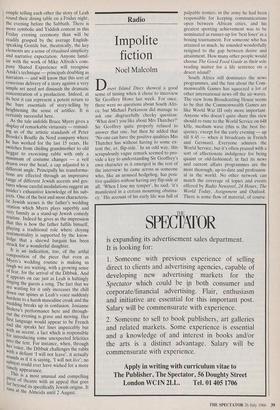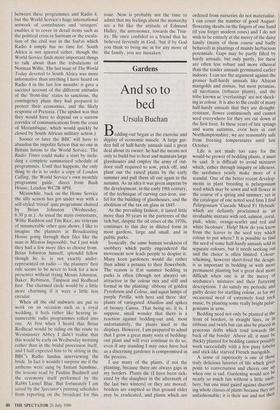Radio
Impolite fiction
Noel Malcolm
Desert Island Discs showed a good sense of timing when it chose to interview Sir Geoffrey Howe last week. For once, there were no questions about South Afri- ca; but Michael Parkinson did manage to ask one disgracefully cheeky question: `What don't you like about Mrs Thatcher?' Sir Geoffrey quite properly refused to answer that one, but then he added that 'No one can have the positive qualities Mrs Thatcher has without having to some ex- tent the, er, flip-side.' In an odd way, this scrupulously vague remark seemed to pro- vide a key to understanding Sir Geoffrey's own character as it emerged in the rest of the interview: he came across as someone who, like an aroused hedgehog, has posi- tive qualities without having any flip-side at all. 'When I lose my temper', he said, 'it's manifested in a certain mounting obstina- cy.' His account of his early life was full of palpable ironies: in the army he had been responsible for keeping communications open between African cities, and his greatest sporting achievement was to be nominated as runner-up for 'best loser' in a boxing tournament. For someone who has attained so much, he sounded wonderfully resigned to the gap between desire and attainment. How many other people would choose The Good Food Guide as their sole reading matter for a life sentence on a desert island?
South Africa still dominates the news programmes, and the fuss about the Com- monwealth Games has squeezed a lot of other international news off the air-waves. The view from Broadcasting House seems to be that the Commonwealth Games are like World War III only more important. Anyone who doesn't quite share this view should re-tune to the World Service on 648 kHz, medium wave (this is the best fre- quency, except for the early evening — up till 8.45 — when it broadcasts in French and German). Everyone admires the World Service, but it's often praised with a sort of affectionate indulgence for being quaint or old-fashioned; in fact its news and current affairs programmes are the most thorough, up-to-date and profession- al in the world. No other network can match the coverage of topics and events offered by Radio Newsreel, 24 Hours, The World Today, Assignment and Outlook. There is some flow of material, of course, between these programmes and Radio 4, but the World Service's huge international network of contributors and 'stringers' enables it to cover in detail items such as the political crisis in Surinam or the escala- tion of the civil war in the Sudan which Radio 4 simply has no time for. South Africa is not ignored either, though the World Service finds more important things to talk about than the tribulations of Norman Willis. The last issue of The World Today devoted to South Africa was more informative than anything I have heard on Radio 4 in the last few months: it gave a succinct account of the different attitudes of the 'front-line' states to sanctions, the contingency plans they had prepared to protect their economies, and the likely response of Pretoria. (The upshot was that they would have to depend on a narrow corridor of communications from the coast of Mozambique, which would quickly be closed by South African military action.) Sooner or later the BBC will have to abandon the impolite fiction that no one in Britain listens to the World Service. The Radio Times could make a start by inclu- ding a complete summarised schedule of programmes. Until that happens, the only thing to do is to order a copy of London Calling, the World Service's own monthly programme guide, direct from Bush House, London WC2B 4PH.
Meanwhile, back on the Home Service the silly season has got under way with a self-styled 'trivial' quiz programme chaired by .Brian Johnston (Wednesday, 6.30 p.m.). As usual the main contestants, Willie Rushton and Tim Rice, are veterans of innumerable other quiz shows; I like to imagine the planners at Broadcasting House going through their files like the man in Mission Impossible, but I just wish they had a few more files to choose from. Brian Johnston himself, splendid fellow though he is, is not exactly under- represented on radio — the planners' first rule seems to be never to look for a new presenter without trying Messrs Johnston, Baker, Robinson, Timpson and Redhead first. The charmed circle would be a little more charming if it were a little less circular.
When all the old stalwarts are put to work on an occasion such as a royal wedding, it feels rather like hearing in- numerable radio programmes rolled into one. At first when I heard that Brian Redhead would be riding on the route to Westminster Abbey I didn't realise that this would be early on Wednesday morning rather than in the bridal procession itself, and I half expected him to he sitting in the BBC's Radio landau interviewing the bride. In fact it wouldn't surprise me if the anthems were sung by Instant Sunshine, the lessons read by Pauline Bushnell and the ceremony itself performed by the Rabbi Lionel Blue. But fortunately I am saved by the Spectator's printing schedules from reporting on the broadcast for this
issue. Now is probably not the time to admit that my feelings about the monarchy are a bit like the attitude of Edmund Halley, the astronomer, towards the Trin- ity. He once confided to a friend that he believed fervently in God, tut if by God you think to bring me in for any more of the family, you are mistaken.'



















































 Previous page
Previous page